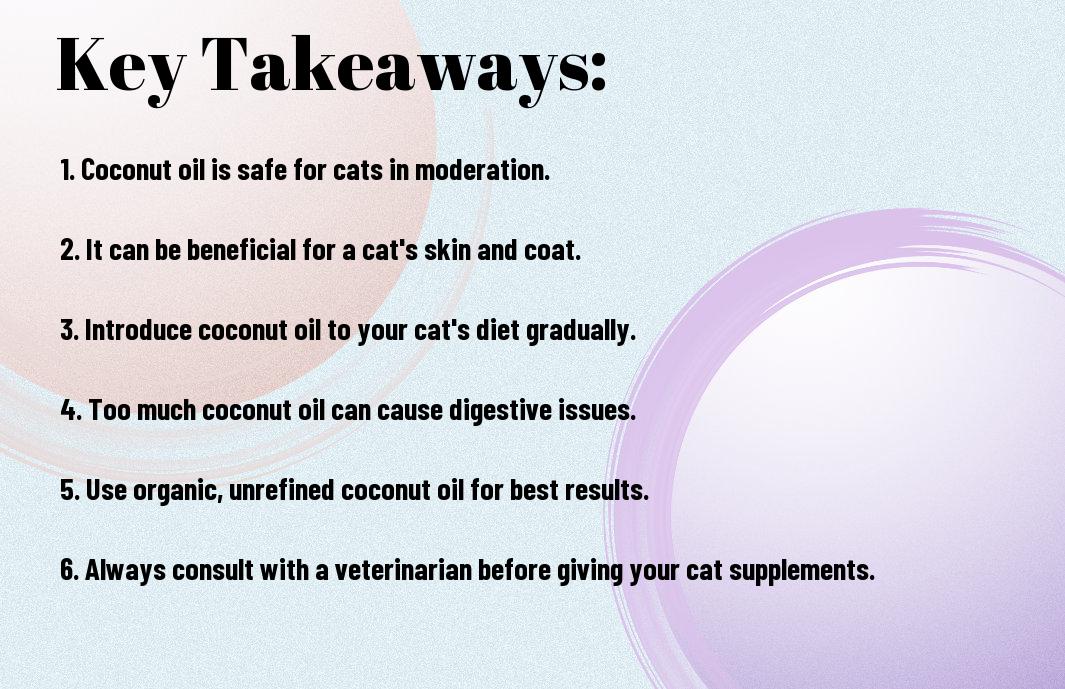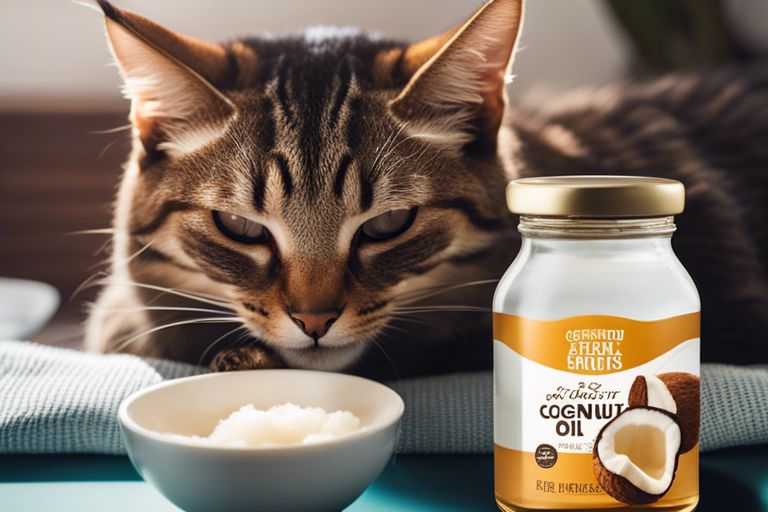Curious about whether coconut oil is safe for your feline friend? As a cat owner, it’s important to carefully consider the foods and supplements you introduce to your pet’s diet. While coconut oil can offer some potential benefits for cats, it’s essential to use caution and understand the potential risks. In this blog post, we’ll explore the safety and potential benefits of feeding coconut oil to your cats, as well as provide some tips for incorporating it into their diet in a safe and responsible manner.

The Nutritional Profile of Coconut Oil
Before we delve into whether cats can safely consume coconut oil, let’s take a look at its nutritional profile. Coconut oil is primarily composed of saturated fats, with small amounts of monounsaturated and polyunsaturated fats. It also contains trace amounts of vitamins E and K, as well as iron.
Key Components of Coconut Oil
An important component of coconut oil is lauric acid, a medium-chain fatty acid that is known for its antimicrobial and anti-inflammatory properties. Additionally, coconut oil contains caprylic acid and capric acid, which also have antimicrobial properties. These components make coconut oil a popular choice for both internal and external use in humans.
Potential Health Benefits for Humans
To date, much of the research on the potential health benefits of coconut oil has focused on humans. Advocates of coconut oil claim that it can improve digestion, boost immunity, and promote healthy skin and coat. Additionally, some studies suggest that the medium-chain fatty acids in coconut oil may aid in weight management and improve cognitive function.
A 2020 study published in the Journal of Medicinal Food found that lauric acid, a prominent component of coconut oil, exhibited strong antimicrobial activity against a variety of pathogens, including bacteria and fungi. This suggests that coconut oil may have potential as a natural remedy for certain ailments.
It’s important to note that while coconut oil may have potential health benefits for humans, it is not a proven or recommended treatment for any specific condition. Additionally, consuming large amounts of coconut oil can lead to weight gain and increase the risk of heart disease due to its high saturated fat content.

Can Cats Consume Coconut Oil?
The idea of giving coconut oil to cats has gained popularity in recent years, with some claiming it to be a panacea for feline health. But is coconut oil safe for cats? Let’s explore this topic in more detail.
Metabolic Differences between Cats and Humans
Metabolically, cats and humans have significant differences. While coconut oil has been marketed as a superfood for humans due to its medium-chain triglycerides, or MCTs, cats may not metabolize it in the same way. Their bodies may not efficiently break down MCTs, which can lead to digestive issues and potential pancreatitis. It’s essential to consider these metabolic differences before introducing coconut oil into a cat’s diet.
Veterinarian Insights on Coconut Oil for Cats
Without a doubt, it’s crucial to seek professional guidance when considering dietary changes for cats. Veterinarians can provide insights based on a cat’s individual health, dietary needs, and any underlying conditions. Some veterinarians may caution against the use of coconut oil for cats, emphasizing the potential risks over the purported benefits.
Cats are obligate carnivores and have different nutritional requirements compared to humans. It’s essential to approach the idea of giving coconut oil to cats with caution and consider consulting a veterinarian before making any changes to their diet.
Risks Versus Rewards
Keep in mind that while coconut oil has some potential health benefits for cats, there are also risks to consider. Just as with any supplement or addition to your cat’s diet, it’s important to weigh the potential rewards against the possible drawbacks.
Possible Health Benefits for Cats
Anecdotal evidence suggests that coconut oil may have several potential health benefits for cats. Some cat owners claim that it can improve their pet’s skin and coat, aid in digestion, and even provide some relief from allergies. Additionally, coconut oil contains medium-chain triglycerides, which are fatty acids that may have antibacterial and antiviral properties. However, it’s important to note that more research is needed to confirm these potential benefits.
Known Risks and Side Effects
Benefits of coconut oil for cats aside, it’s crucial to be aware of the known risks and potential side effects. One of the main concerns is that coconut oil is high in saturated fat, which can lead to obesity and other health issues if not given in moderation. Additionally, some cats may experience gastrointestinal upset, such as diarrhea, if they consume too much coconut oil. Furthermore, if a cat consumes large amounts of coconut oil, they may be at risk of pancreatitis, a potentially serious inflammation of the pancreas.
Known risks and side effects of coconut oil for cats include potential gastrointestinal upset, obesity if given in excess, and the risk of pancreatitis if consumed in large amounts. It’s important to consult with your veterinarian before adding any new supplements to your cat’s diet to ensure their safety and well-being.

How to Safely Introduce Coconut Oil to Your Cat’s Diet
Unlike dogs, cats can be more finicky about trying new foods or supplements. When introducing coconut oil to your cat’s diet, it’s important to do so gradually and carefully. This will help minimize any potential digestive upset or aversion to the new taste.
Start by offering your cat a very small amount of coconut oil mixed in with their regular food. Monitor their reaction and any changes in their digestion or behavior over the next few days before gradually increasing the amount. This slow introduction will allow your cat’s body to adjust to the new addition and reduce the risk of any adverse effects.
Recommended Dosage and Frequency
Frequency is key when it comes to introducing coconut oil to your cat’s diet. It’s recommended to start with a dosage of 1/4 teaspoon of coconut oil per day for small cats, and 1/2 teaspoon for larger cats. This can be divided into smaller servings throughout the day to ensure it’s well-tolerated.
Gradually increase the dosage over time, but do not exceed 1 teaspoon per 10 pounds of body weight per day. Always consult with your veterinarian to determine the appropriate dosage for your individual cat based on their specific health needs.
Best Practices and Considerations
One important consideration when introducing coconut oil to your cat’s diet is to use organic, virgin coconut oil that is free from added preservatives or flavorings. It’s also essential to monitor your cat’s weight and any changes in their coat or skin condition when adding coconut oil to their diet. Always be mindful of any potential allergic reactions or sensitivities.
This will ensure that your cat receives the full potential benefits of coconut oil without any unnecessary risks to their health. Regular communication with your veterinarian is crucial in establishing a safe and effective coconut oil regimen for your feline companion.
Can Cats Eat Coconut Oil? Is It Safe For My Cats?
Upon reflecting on the question of whether cats can eat coconut oil, it is important to note that while coconut oil is generally considered safe for cats in small amounts, it should be used with caution. Coconut oil may provide some benefits for cats such as improving their skin and coat health and aiding in digestion, but too much can result in digestive issues and weight gain. It is always best to consult with a veterinarian before introducing any new supplement or food into your cat’s diet. In conclusion, while coconut oil can be safe for cats in moderation, it is important to be mindful of portion sizes and potential side effects to ensure the well-being of your feline friend.
FAQ
Can cats eat coconut oil?
Yes, cats can eat coconut oil in small amounts. It can provide them with various health benefits, including improved digestion, healthier skin and coat, and potential immunity support.
Is coconut oil safe for my cats?
Coconut oil is generally safe for cats when given in moderation. However, it is important to introduce it gradually into their diet to avoid any potential digestive upset. Additionally, it is essential to ensure that the coconut oil is of high quality and free of any additives.
How much coconut oil can I give to my cats?
It is recommended to start with a small amount of coconut oil, such as 1/4 teaspoon per day, and gradually increase the dosage based on your cat’s size and response. It is crucial not to exceed the recommended dosage, as too much coconut oil can lead to weight gain and gastrointestinal issues.

Hello there, I am Iftekhar Ahmed. I am the owner of Mishka & The Cat Corners. I love to explore and write on various topics about cats

